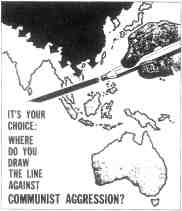One of the reasons given by Prime Minister Menzies in committing Australian combat troops to Vietnam was that we would thereby be fulfilling a commitment not to Vietnam, but to the United States, which needed support for its involvement in the war.
This can be seen in the advice given to the Australian government by its Ambassador to Washington:
'Our objective should be ... to achieve such an habitual closeness of relations with the United States and sense of mutual alliance that in our time and need, after we have shown all reasonable restraint and good sense, the United States would have little option but to respond as we would want.' 'The problem of Vietnam is one, it seems, where we could ... pick up a lot of credit with the United States, for this problem is one to which the United States is deeply committed and in which it genuinely feels it is carrying too much of the load, not so much the physical load the bulk of which the United States is prepared to bear, as the moral load.'
It is also true that there were some people who opposed the war from the start and believed that it was of no concern to Australia. Opposition Leader Arthur Calwell represented this view right from the start of Australia's involvement:
'We do not think it is a wise decision. We do not think it is a timely decision. We do not think it will help the fight against Communism. On the contrary, we believe it will harm that fight in the long term. We do not believe it will promote the welfare of the people of Vietnam. On the contrary, we believe it will prolong and deepen the suffering of that unhappy people so that Australia's very name may become a term of reproach among them. We do not believe that it represents a wise or even intelligent response to the challenge of Chinese power. On the contrary, we believe it mistakes entirely the nature of that power, and that it materially assists China in her subversive aims. Indeed, we cannot conceive a decision by the Government more likely to promote the long term interests of China in Asia and the Pacific.'

1966 Election campaign poster, Liberal Party of Australia
However, many people genuinely believed that our involvement in the war was necessary because the war in Vietnam did affect Australia directly - it was our war. This can be seen in, for example, the Prime Minister's speech committing Australians, and in the attitude of some of the soldiers involved:
'There can be no doubt of the gravity of the situation in South Vietnam. There is ample evidence to show that with the support of the North Vietnamese regime and other Communist powers, the Viet Cong has been preparing on a more substantial scale than ... (before) insurgency action designed to destroy South Vietnamese government control, and to disrupt by violence the life of the local people ... The takeover of South Vietnam would be a direct military threat to Australia and all the countries of South and South-East Asia. It must be seen as part of a thrust by Communist China between the Indian and Pacific Oceans.' 'Behind Vietnam lies a wider conflict that extends from the northern frontiers of India to the dividing line in Korea; that engages the world wide diplomacy of the United States; and that casts a shadow of fear over millions of people in all lands of southern Asia no less than the shadow of terror over the villagers of the Mekong delta. This is a war that affects the fate of all countries of South-east Asia -- a war that throws into sharp relief the aim of Communist China to dominate them by force.'
(Menzies Government Minister Hasluck, 1966)
'I subscribe to the domino theory ... because I believe it obvious ... that if the Vietnam War ends with some compromise that denies South Vietnam a real and protected independence, Laos and Cambodia, Thailand, Malaysia, Singapore and Indonesia will be vulnerable ... this domino theory ... has formidable reality to Australians who see the boundaries of aggressive communism coming closer and closer.'
(Prime Minister Sir Robert Menzies)





